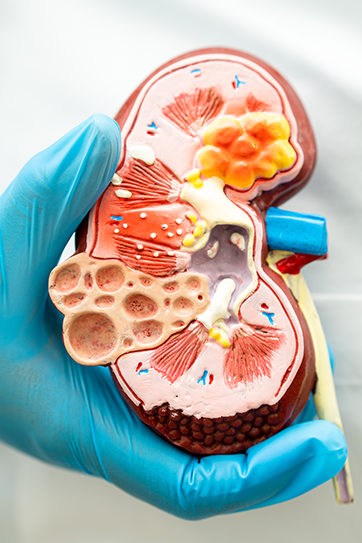Kidney cancer is a type of cancer that arises from the uncontrolled growth and proliferation of cells in the kidney tissues.
The kidneys are vital organs that filter waste materials and excess water to produce urine. Kidney cancer is often referred to as renal cell carcinoma and has the potential to spread to other organs. Early diagnosis and the selection of appropriate treatment methods are crucial in improving the quality of life for individuals with kidney cancer.
Regular health check-ups after treatment are important for monitoring the patient's condition and detecting potential recurrences early. Every patient should collaborate with their healthcare team to gain detailed information about the treatment process and understand their situation.
Symptoms of kidney cancer may not be apparent in the early stages, making the signs more noticeable as the disease progresses. Symptoms of kidney cancer may include:
Each of these symptoms alone may not be sufficient to confirm kidney cancer and may be indicative of other health issues. However, it is crucial to contact a healthcare professional immediately if any of these symptoms are noticed. Early diagnosis can increase the chances of successful treatment and prevent the progression of the disease.
Staging kidney cancer is a classification used to determine the extent of the disease's spread and the location of the tumor within the body. Staging aids healthcare professionals in creating an appropriate treatment plan and assessing the prognosis of the disease. Kidney cancer is generally categorized into four stages: I, II, III, and IV.
Angiomyolipoma is a tumor that typically develops on the cortical surface of the kidneys, containing fat, irregular muscle tissue, and blood vessels. These tumors are often incidentally detected during another medical examination or through imaging methods. Angiomyolipomas are usually benign, tend not to grow significantly, and often do not present symptoms. However, larger angiomyolipomas may carry a risk of bleeding and, in rare cases, may require surgical intervention.
Oncocytoma is a type of tumor where kidney cells accumulate a large amount of a specific type of cell called oncocytes. Oncocytes are cells with a high concentration of mitochondria, the cell organelles responsible for energy production. Oncocytomas are generally small, benign tumors that often do not develop into cancer. They generally do not present symptoms and are usually incidentally detected during imaging tests. Since they rarely exhibit growth tendencies, most cases do not require surgical intervention.
The diagnosis of kidney cancer is established through a series of tests and imaging methods. The diagnostic process is based on the patient's symptoms, risk factors, and physical examination. Urine and blood tests are used to assess kidney function and detect signs of tumors. Imaging tests, including computerized tomography (CT), magnetic resonance imaging (MRI), and ultrasound, create detailed images of the kidneys to identify tumors.
Intravenous urography allows the visualization of the kidneys and urinary tract through colored X-ray films. Biopsy involves examining tissue samples taken from the kidney to determine the type of tumor. Intravenous contrast tomography (angiography) visualizes blood vessels, helping assess the impact of the tumor on blood vessels.
Kidney cancer treatment involves a personalized plan determined by various factors such as the patient's overall health, tumor size, stage, and extent of spread. Typically, a combination of different methods, including surgery, radiation therapy, chemotherapy, targeted therapies, and immunotherapy, may be used.
Surgery is the most common method used in kidney cancer treatment. Radical nephrectomy or partial nephrectomy may be employed to remove the tumor. Radical nephrectomy involves the removal of the entire kidney, while partial nephrectomy removes only the tumor and the surrounding healthy tissue. Radiation therapy aims to target cancer cells using high-energy rays to kill them. Chemotherapy is a treatment method that aims to control or kill cancer cells but has limited effectiveness in kidney cancer.
Targeted therapies focus on specific molecules to halt the growth of cancer cells. Immunotherapy boosts the immune system to fight against cancer cells. Kidney cancer treatment generally involves a combination of one or more of these methods. Creating a treatment plan requires the involvement of a multidisciplinary healthcare team to determine the most effective strategy tailored to the patient's needs. For more detailed information, you can contact Medwide.




Get practical information about the topics you are most curious about. Everything you need to make informed decisions on your beauty and health journey is here with all the details from A to Z.
While it may not be possible to completely prevent kidney cancer, taking some preventive measures can reduce the risk. Adopting a healthy lifestyle, regular exercise, balanced nutrition, not smoking, maintaining a healthy weight, and participating in regular health check-ups can reduce the risk of kidney cancer.
Kidney cancer is often asymptomatic in the early stages and can go unnoticed until later stages. However, when diagnosed early and treated appropriately, the prognosis is generally good. Nevertheless, it can be fatal depending on the stage of the disease, tumor size, spread, and other factors. Early diagnosis and effective treatment can increase the chances of success.
Embolization is a method used in kidney cancer treatment. In this procedure, the blood vessels that supply the tumor are blocked or narrowed. This often helps control the tumor's growth, and it can be applied either before surgery or sometimes to support surgical intervention. Embolization can reduce the blood supply to the tumor, leading to tumor shrinkage and enhancing the effectiveness of the treatment process. However, since each patient's situation is unique, it is essential to consult with a specialized healthcare professional for this treatment option.
Medwide meticulously arranges airport transfers for patients and their companions, ensuring their comfort and satisfaction.
Medwide's VIP transfer service offers patients a personalized and privileged travel experience, providing exceptional service.
Medwide transports patients and their companions comfortably and luxuriously, making their journeys enjoyable and relaxing.
Medwide offers quality healthcare services to patients at affordable prices, ensuring transparency and fairness in costs.
Medwide provides fast treatments by reducing patient wait times, our expert doctors promptly respond to our patients' needs.